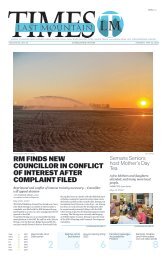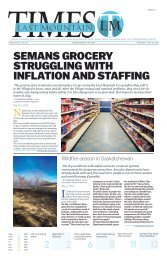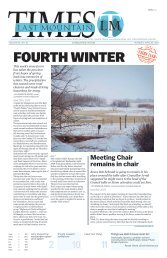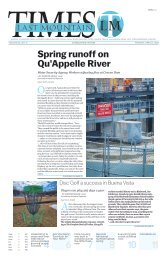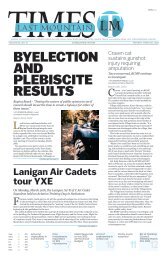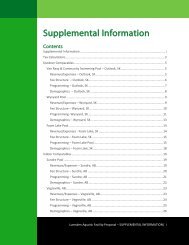LMT Aug 30 - Vol 114 - issue 36
Create successful ePaper yourself
Turn your PDF publications into a flip-book with our unique Google optimized e-Paper software.
lmtimes.ca • Last Mountain Times • Monday, <strong>Aug</strong>ust <strong>30</strong>, 2021 • /lastmountaintimes • @lmtimes<br />
A portion of expected<br />
yield<br />
21092BS1<br />
5<br />
There is not a lot to suggest the cloud of drought, which hangs over the Canadian<br />
Prairies, will have a silver lining for farmers,<br />
But some good news comes in part because crop yields will be low. Producers<br />
can anticipate some very high prices over the next few months as the full impact<br />
of the drought on production is better defined by actual crop in the bin numbers.<br />
There are already suggestions out there that lentil demand<br />
AG NOTES<br />
CALVIN DANIELS<br />
is going to be high, partly because there has been a drought<br />
in Turkey, and that country is a major lentil consumer. India<br />
is also expected to be an active buyer, having reduced import<br />
tariffs in order to assure supplies there.<br />
Of course, those high prices won’t be fully realized by<br />
producers here, with yields expected to be significantly below<br />
long-term averages. However, it might provide a bit of<br />
a financial buffer if the bushels produced are sold at higher<br />
than normal prices. It’s the same across most crops, which<br />
is the good news of a sort. But, not every bushel produced<br />
this fall will be able to garner the higher prices.<br />
As a financial tool, many producers’ forward price’ at least a<br />
portion of expected yield. The practice provides some know numbers for creating<br />
a financial plan. For some producers, the lower yields expected this year<br />
may not even fulfill the forward pricing contracts, which means no bushels to<br />
sell into a higher market now, and many producers will need to work with the<br />
contractor on just how they fulfill their part of the deal.<br />
The other <strong>issue</strong> may well be what grade the grain comes off this fall.<br />
With any luck, we won’t suddenly hit a wet spell which would be a disaster<br />
now that it is harvest time, but even with an open dry fall, grades may be hit<br />
hard. In the driest of areas, that is, large parts of the Prairies, the lack of moisture<br />
and extreme heat as heads filled will mean less than fully developed grain<br />
in the head. The usual plump kernels simply will not be there, and that can<br />
mean a lower grade, which in turn means lower prices.<br />
And while the situation is not good at present, and it is only <strong>Aug</strong>ust, there<br />
must be concerns when looking ahead to 2022.<br />
We haven’t gotten a lot of fall rain in recent years, and even winter snowfall<br />
has not been huge of late, and both things would be good in terms of replenishing<br />
soil moisture levels pore-seeding 2022. If those things do not occur, big fall<br />
rains and lots and lots of snow, producers are going to need spring rains to get<br />
a crop growing, but not so much they can’t plant, and then a far wetter summer<br />
than we have had in 2021.<br />
- Calvin Daniels<br />
Comment on this article at lmtimes.ca/calvin<br />
Disclaimer: opinions expressed are those of the writer.<br />
Consortium - continues from page 1<br />
the RM grades it as they do the RM<br />
roads; however, Strasbourg hadn’t put<br />
in gravel this year. Schmidt said they<br />
would contact the town of Strasbourg<br />
to let them know it needs to be done.<br />
Schmidt used Island View as an<br />
example because they had always<br />
supplied their own gravel. Herman<br />
agreed however implied the RM may<br />
have gravelled the road two years ago.<br />
Herman said Pelican Point also supplied<br />
gravel.<br />
Schmidt said it is a concern because<br />
the RV’ believe the RM is responsible<br />
for keeping the road in a safe and<br />
useful condition. He said that the RM<br />
grades and mows the grass.<br />
Councillor Gilbert said, “if there’s<br />
not much gravel on the road how are<br />
we supposed to keep it in a safe condition.”<br />
Schmidt said he went down the<br />
road the day before and noted there<br />
was not much gravel on the road. He<br />
said that Herman had tried to grade<br />
it, but “you can’t make anything out of<br />
it without gravel.” To which Herman<br />
agreed.<br />
Councillor for the Resort Village of<br />
Sunset Cove, Tom Fulcher, said the<br />
four resort villages in the RM formed<br />
a consortium. Fulcher speaks on behalf<br />
of the group.<br />
Despite Reeve Schmidt’s claim that<br />
the resort villages are expecting a<br />
maximum level of service from the<br />
RM, Fulcher said, “We have not placed<br />
any expectations on them at all other<br />
than to abide by the Municipalities Act<br />
which says to keep the roads in a safe<br />
condition.”<br />
“Our position is that there is a<br />
minimum standard of what a safe road<br />
would be. A safe road would include<br />
being able to get our residents, emergency<br />
service vehicles and school buses<br />
into our resort in a timely fashion<br />
and keeping our ditches mowed.”<br />
Fulcher said it’s common sense<br />
that if there is no gravel on the roads,<br />
they will turn into mud, making them<br />
unsafe. “If they are muddy roads can<br />
people safely travel on them? can<br />
emergency services travel on them?<br />
Can we get an ambulance in? can we<br />
get a police car in? can we get a fire<br />
truck in?”<br />
Fulcher said that even though the<br />
Resort Villages do not feel they are<br />
legally bound to enter into a road<br />
maintenance agreement with the<br />
RM of McKillop and don’t believe<br />
the Saskatchewan Municipal Board<br />
would mandate it; that in the spirit of<br />
co-operation and community cohesiveness,<br />
they are willing to enter into<br />
one, providing some funding to help<br />
maintain the roads. He said that “We<br />
don’t believe the SMB would mandate<br />
us to enter into one however we are<br />
still prepared to enter into one just to<br />
get along with the RM. We are part of<br />
the community. We like to think we<br />
are part of the community. We truly<br />
do appreciate that there are costs<br />
to maintain these roads but we also<br />
believe that it’s the RM’s legal responsibility<br />
to do so, but having said<br />
that we are willing to provide some<br />
funding towards maintaining these<br />
roads. However it appears the money<br />
that we’ve offered isn’t sufficient for<br />
the RM. The money we have offered is<br />
100% of the maximum rates that are<br />
prescribed under the Municipal Regulations.<br />
The Municipal Regulations<br />
prescribe what road hauling rates will<br />
be. So we, as resort villages, have offered<br />
the RM 100% of those rates…the<br />
RM has chosen not to accept that.”<br />
“We said to the RM… if you don’t feel<br />
that is sufficient, your argument isn’t<br />
with the resort villages, your argument<br />
is with the provincial government<br />
who sets these rates.” Fulcher<br />
said the RM should lobby the provincial<br />
government through SARM,<br />
saying these rates aren’t sufficient.<br />
“Instead,” he said, “they are continuing<br />
to go after us over what they feel<br />
is inadequate financial contributions<br />
towards these roadways.”<br />
Jennifer Argue, Local Journalism<br />
Initiative reporter<br />
Note: These reports are abridged for content



